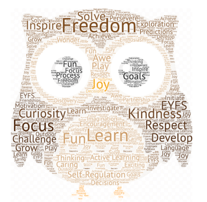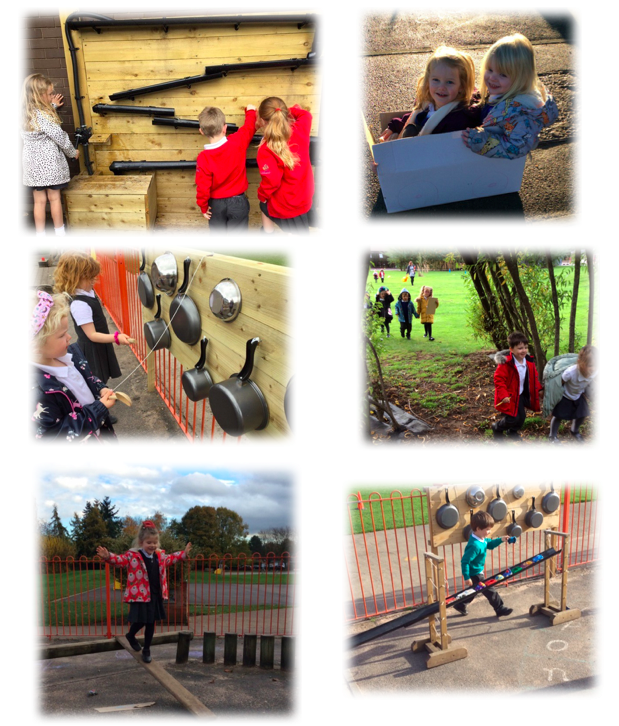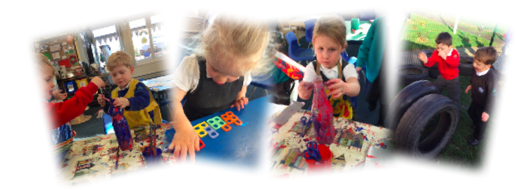Our EYFS progression document.
Every child deserves the best possible start in life and the support that enables them to fulfil their potential. Children develop quickly in the early years and a child’s experiences between birth and age five have a major impact on their future life chances. A secure, safe and happy childhood is important in its own right. Good parenting and high quality early learning together provide the foundation children need to make the most of their abilities and talents as they grow up.
Statutory framework for the Early Years Foundation Stage, Department for Children, Schools and Families, 2021
Our Early Years Team is committed to providing children with the best possible start to school life. We give children opportunities to follow their interests and strive to ensure our children are happy, enthusiastic and confident learners with the skills, knowledge and understanding they need to prepare them for future challenges.
Parent and carer partnership is a key factor in the progress that children make during their time in the Early Years. We value parent communication to achieve the full picture of each individual child’s development and learning journey.
Pedagogical Approach
We sow the seed: All learning themes are started with a learning launch or hook to inspire children’s learning. Children suggest ideas as to which direction they want to take their learning in. We engage: Activities are hands on, creating curiosity and wonder. We follow the children’s interests to engage and inspire their learning. We develop: Cross-curricular links are developed to support the development of the whole child. Activities are planned based on individual next steps. We enable our children to freely explore the world around them, creating opportunities to challenge and support learning through our curriculum enhancements. We harvest: Our aim is to enable our children to become independent learners. Our learning outcomes and achievements are shared in our online learning journals, Tapestry and shared with family members.
Intent
At Aspin Park Academy, we develop our children holistically laying foundations for personal, social and emotional learning, with a focus on well-being. We aim to motivate, engage and inspire our children to be active learners by embedding high aspirations and positive attitudes for learning. We believe that play has a pivotal role in developing children’s confidence, collaboration and love of learning. We support children's learning by following their interests and fascinations.
Implementation
Our approach is implemented through a balance of child-led and adult-initiated teaching and learning to capture children’s interests and inspire new ideas. Our curriculum is developed based on the cultural capital we know our pupils need so that they can gain the knowledge, skills and understanding they require for success. We understand that children need to feel happy and safe in their environment which means it is vital to promote positive relationships between children, staff and parents. Our enabling environment and warm, skilful adult interactions support the children as they begin to link learning to their play and exploration. We create opportunities and experiences in a stimulating environment to promote discussion, exploration and curiosity. Our aim is to promote children’s independence, resilience and critical thinking, through the Characteristics of Effective Teaching and Learning.
Impact
The impact of our EYFS approach is to ensure we provided our children with the best possible start to school life. We want our children to leave Early Years as confident, independent young learners ready to thrive in anything they choose to pursue.
EYFS British Values Statement
Democracy
Children enjoy having responsibilities around the classroom. Our ‘special helpers’ enjoy volunteering for different jobs such as; being in charge of snack, tidying up or handing out letters. Children are also involved in collaborative decision making where they make choices about what they would like to learn throughout our class topic.
The children enjoy exploring authors through a range of books. At the end of each day, children have the opportunity to vote for which story they would like to read. Children learn to understand that the majority vote is a fair way of choosing which story is read.
The Rule of Law
Children are taught from an early age about the rules and expectations of our School and the wider community. Our class rules and behaviour expectations are displayed around the classroom to remind children of their behaviour. Children understand that class rules help to keep them safe and ensure that everyone has a fair turn. Rewards, such as team tokens or stickers, are given for consistent good behaviour and there are consequences for when rules are broken. Children are encouraged to have ‘kind hands’ and to respect one another to develop an understanding of right and wrong.
Our Topic ‘All About Me’ in the Autumn Term will explore ‘superhero behaviour’ as well as behaviour expectations in the class. Children will learn about School rules and expectations as well as the importance of staying safe in both the inside and outside learning environment.
Individual Liberty
During child-initiated play, children have the opportunity to explore the environment around them. Children are frequently given the freedom of choice, where they can take their learning in their own direction based on their individual interests. Resources are freely accessible to the children to encourage children to become independent learners. During Circle Time children explore the meaning of friendship and are taught about the importance of being a kind friend. Bullying is also explored and children have an understanding of what to do and who to speak to if bullying occurs in School.
In the Spring Term,’ Learning Passport Challenges’ are introduced as part of our enhanced provision. Children are given the choice about which learning challenges they would like to complete and can choose how they record their learning.
Mutual Respect and Tolerance of those of those of Different Faiths and Beliefs
Children are expected to respect their peers and all staff in the school community. Children are asked to enter the classroom with ‘listening ears’ to show that they are ready to listen. The children learn that it is important to listen to everyone’s ideas and opinions, and to show respect when someone else’s opinions differ from their own. Diversity is promoted through Circle Time and class assemblies where children have the opportunity to listen to a range of stories from different cultures around the world. This year we will celebrate a range of festivals and celebrations such as Diwali, in the Autumn Term, and Chinese New Year, in the Spring Term.
Our Early Years Curriculum
Statutory Framework for the Early Years Foundation Stage, September 2023
The Early Years Foundation Stage (EYFS) sets the standards that all early years providers must meet to ensure that children learn and develop well and are kept healthy and safe. It promotes teaching and learning to ensure children’s ‘school readiness’ and gives children the broad range of knowledge and skills that provide the right foundation for good future progress through school and life.
The following principles shape our practice:
- The Unique Child- every child is a unique child, who is constantly learning and can be resilient, capable, confident and self-assured
- Positive Relationships- children learn to be strong and independent through positive relationships
- Enabling Environments- children learn and develop well in enabling environments with teaching and support from adults, who respond to their individual interests and needs and help them to build their learning over time. Children benefit from a strong partnership between practitioners and parents and/or carers.
- Learning and Development- Children develop and learn at different rates.
Development Matters, July 2021
When we give every child the best start in their early years, we give them what they need today. We also set them up with every chance of success tomorrow. Development Matters, non-statutory guidance for the Early Years Foundation Stage, Department for Education, 2021
Learning and Development
Children will learn skills, acquire new knowledge and demonstrate their understanding through the 7 areas of learning and development.
Prime Areas:
- Communication and Language
- Physical Development
- Personal, Social and Emotional Development
Specific Areas:
- Literacy
- Mathematics
- Understanding the World
- Expressive Arts and Design
Characteristics of Effective Teaching and Learning
Characteristics of Effective Learning are a key element in the EYFS Curriculum.
A child's individual learning characteristic will determine the way they respond to both teaching and learning that takes place at school.
The three characteristics are identified as:
- Playing and Exploring- children investigate and experience things, and ‘have a go’.
- Active Learning- children concentrate and keep on trying if they encounter difficulties, and enjoy achievements
- Creating and Thinking Critically- children have and develop their own ideas, make links between ideas, and develop strategies for doing things.
The Characteristics of Effective Learning focus on how children learn (the process) rather than what they learn (the outcome).
Our Learning Themes
Our approach to teaching and learning is through a mixture of topic-led and child-led learning. All topics and learning themes take the children’s current learning interests into account.
Our Indoor Classrooms
Our Outdoor Environment
In Reception we use Tapestry to share your child’s learning journey. We will share photos and videos of the activities and learning that your child has been involved in during school for you to see and comment on. We love to see the children’s experiences and hobbies out of school and therefore encourage parents to upload photos and videos. We will upload a weekly diary to Tapestry to outline all the learning we have covered each week as well as questions to promote discussions with your child about their learning as part of their talking homework. We upload lots of other useful documents to help you understand what your child is learning at school. You can also use Tapestry as a tool to communicate with your class teacher.
Our Pupils tell us…
“We have lots of fun and there are loads of toys to play with. I like the Mud Kitchen the best!”
“We’ve been learning about Space. We had a real star in the classroom that fell from the sky!”
“We get to play on the field and there’s loads of space to run around and have fun!”
“Lunch time is good ‘cos you get to eat yummy food!”
“We have really good teachers that help us learn and look after us!”
































